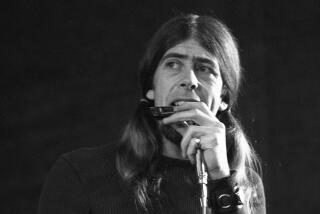Proof that a piano can key diverse artistry
- Share via
It’s a truism that the piano is an orchestra in itself -- simultaneously a melodic, harmonic and percussive instrument. And it’s not surprising that the diversity of options has resulted in some of jazz history’s most extraordinary musical accomplishments, from the ragtime of James P. Johnson and the disjunct rhythms of Thelonious Monk to the flowing bebop of Bud Powell and the luxurious harmonies of Bill Evans.
Here are some current examples of its vital role in the music’s continuing creative evolution.
Keith Jarrett Trio
“Up for It: Live in Juan-Les-Pins” (ECM)
*** 1/2
The question that always comes to mind with the arrival of an album from Jarrett, bassist Gary Peacock and drummer Jack DeJohnette is when their fascination with popular standards will lose its spark of inspiration. And the answer, once again, is not yet. After taking a break from standards in his last two free-improvisation releases, Jarrett once again displays his ability to find new riches in what would seem to be a well-examined musical lode.
The album, which celebrates the trio’s 20 years as a working ensemble, was recorded last summer at the rain-swept Antibes Jazz Festival in performances Jarrett describes in liner notes as “swinging in the rain.”
Much of the program is devoted to such familiar items as “If I Were a Bell,” “My Funny Valentine” and “Someday My Prince Will Come.” But there also are three jazz classics: Oliver Nelson’s boppish, hard-swinging “Butch and Butch,” John Lewis’ “Two Degrees East, Three Degrees West” and Charlie Parker’s “Scrapple From the Apple” (a kind of standard in itself, since the chord changes are based on “Honeysuckle Rose”). Finally, there is Jarrett’s own title track tacked on to the close of “Autumn Leaves.”
The trio’s performances, mostly at briskly swinging tempos, are filled with high-voltage passages alternating with occasional moments of languid lyricism. For anyone who still hasn’t experienced the pleasures of the group’s continuing exploration of standards, “Up for It” is as good place as any to begin.
Martial Solal
“NY1: Live at the Village Vanguard” (Blue Note)
*** 1/2
The Algerian-born pianist is surely one of the most under-recognized, underappreciated artists in jazz history. And it’s hard not to suspect that his European background, combined with the rarity of his appearances in the U.S., has something to do with his low visibility.
Even so, at 75 he continues to be a stunningly original pianist, and this new trio release offers vivid testimony to his ability to reinvent virtually every piece he plays. His versions of “What Is This Thing Called Love?” “Body and Soul” and “Softly, as in a Morning Sunrise” are good examples. Thirty years ago, his renderings might easily have been labeled avant-garde. A more contemporary description might be postmodern, an approach based on the premise that interpretation is everything.
In terms of jazz improvisation on standards, that simply opens the door to interpreting the music through the filter of one’s own individual reality. Which is precisely what Solal does, sometimes in wildly pointillistic passages, sometimes with briskly swinging bop lines, sometimes in lush, impressionist harmonies.
He couldn’t have chosen better companions to travel this route than bassist Francois Moutin and drummer Bill Stewart, who match crisp technical articulateness with a startlingly empathic understanding of Solal’s intentions.
Solal opens a six-night run at the Jazz Bakery on Tuesday with Moutin and the bassist’s twin brother, drummer Louis Moutin.
Ahmad Jamal
“In Search of ... Momentum” (Dreyfuss Jazz)
***
Eluding the influences flowing from Bud Powell, Bill Evans and Herbie Hancock hasn’t been easy for most of the pianists who have arrived on the jazz scene since the bebop ‘40s and ‘50s. But it was no problem for Jamal, whose style was so unique, even in the early years of the mid-’50s, that Miles Davis cited him as having had a significant impact on his own approach to musical space and rhythm.
Jamal takes a somewhat broader view, describing himself as “a musical storyteller who cares about the dynamics of music because musical dynamics are human dynamics.” And typically, “In Search of
He is aided enormously by two longtime associates, bassist James Commack and drummer Idris Muhammad.
More to Read
The biggest entertainment stories
Get our big stories about Hollywood, film, television, music, arts, culture and more right in your inbox as soon as they publish.
You may occasionally receive promotional content from the Los Angeles Times.










